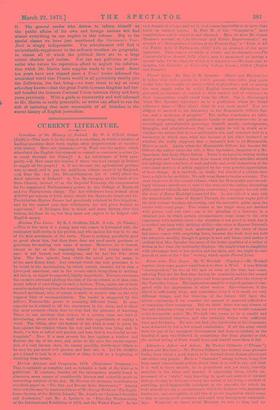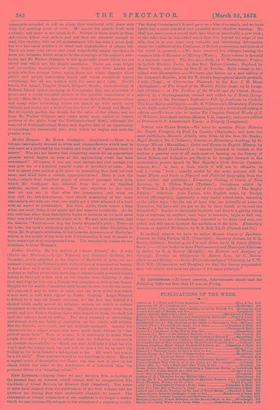Adventures Afloat and Ashore. By Parker Gillmore (" Clique ").
(Hurst and Blackett.)—Mr. Parker Gillmore has written some pleasant books, from which a good deal is to be learned about distant places and out-of-the-way people. He is a "character" among writers, being free from many conventional notions about what it is well to say, and what it is well to leave unsaid ; he is prejudiced and yet frank, honestly material in his ideas and manner of expressing them, wholly un- possessed of a "style," very knowing in sport and matters of natural history, though he does not convey the notion of his being a student of anything, good-humouredly indulgent to the pursuits for which he feels himself too old, a circumstance which he deplores with ingenuous frankness ; and susceptible of odd bits of poetic inspiration which come to him on unexpected occasions, and amid very incongruous surround- ings. Whatever we know about Montana we owe to him, and ho apparently intended to tell us about that wonderful wild piece only from the sporting point of view. He meant his prairie book very seriously, and there is not mach in it. Neither is there much in these Adventures Afloat and Ashore, and yet they are pleasant enough to read, like chatting with an old acquaintance who has seen a great deal, but who has many eradities of mind and quaintnesses of phrase left. There are some very clever and some remarkably stupid anecdotes in these two volumes, which seem to be the scrapings of the author's note- books, and Mr. Parker Gillmore is not apparently aware which are the clever and which are the stupid anecdotes. There are some bright and interesting descriptions of places which are little known and people who live strange lives ; again, there are whole chapters about places and people concerning which and whom everybody knows everything, but all are written with the same good faith. Devil's Island, Cat Island, Tangier Sound, Hooper's Straits, duck-shooting at Holland Island. oyster-dredging in Chesapeake Bay, the migration of geese, and a really beautiful picture of the possible experiences of a lovely "Blue Bird," the American rival of our Robin Redbreast; —these and many other interesting topics are mixed up with much sorry rubbish, and stories not a whit above the level of Tommy and Harry."
But wo readily pardon the dough for the sake of the plums, and we hope Mr. Parker -Gillmore may make many more rushes to remote portions of the globe from the Northumberland Hotel, although the removal of Northumberland House may deprive him of an opportunity of repeating the inscrutable joke with which he begins and ends the present work.



































 Previous page
Previous page